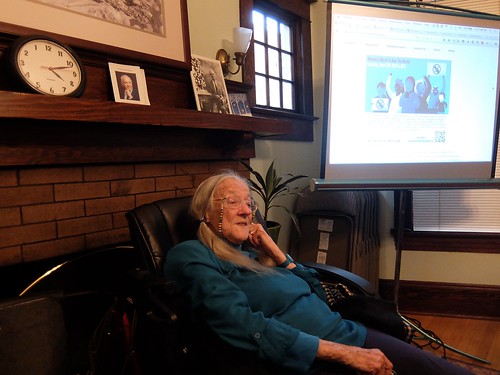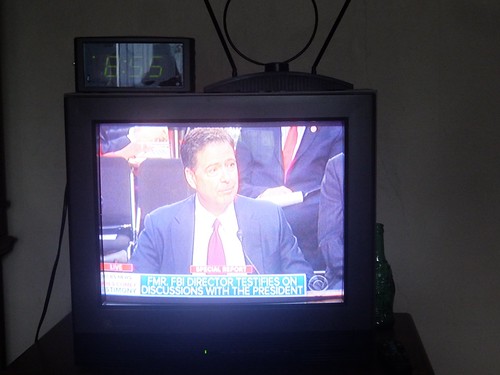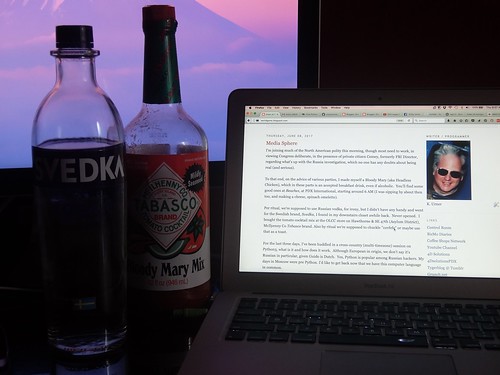A few of us independently minded were somewhat tongue in cheek on board with Singularity for President. My twitter feeds (@thekirbster, @ 4DsolutionsPDX) will show some evidence of my supporting that campaign. More than a serious religion, this meme was a dig at the relevance of the usual suspects, pointing instead to a kind of black hole in Cyberia.
Uber and Lyft drivers are these days told to love their jobs while they can, as the big bad driverless car is just around the corner. Behind these autonomous vehicles lurk another set of memes, stitched together in a kind of marketing hype science fiction, whereby a form of "artificial intelligence" (AI) might threaten just about any job (as in "livelihood").
I'm not about to discount the power of our learning to co-habitate with our machines. We needed some serious steam pressure to activate the industrial age, leading to dirty coal fired furnaces and soot everywhere. We gradually got it down to just greenhouse gases, saving the ozone layer (fingers crossed) but now we're starting to literally cook.
The hope is we might do a lot less polluting commuting and enjoy our electronics a lot more, thereby giving the planet a chance to cool. We're proving we can sustain some pretty serious viewing habits, when it comes to staring at screens. I'm not saying we've properly balanced that sedentary lifestyle with the outdoorsy more camp-like experience we'll need to stay competent outside of densely urban areas. Simply walking over rough terrain takes talent.
However getting to these lifestyle places requires something other than the passing and enforcement of laws. People think in terms of "making rules" when a more useful shoptalk would involve "playing games" (which have rules). Game playing is where social media come in, and with the design and evolution of social media, comes what we might call "social engineers" except that sounds ominous.
Americans have frightened themselves with the word "social" and therefore even "sociality" and "sociology" have a scary ring. Combine "social" with "engineering" and you get "Russian hacker" or worse, but then we think of Facebook and Google and remember Steve Jobs and Bill Gates.
We've had our revenge of the nerds, or geeks inheriting the earth (Bible off by a letter or two) -- world domination they called it. Now we're back in the realm of politics and at a higher level than many attain. A picture emerges of politicians up and down a ladder, along with PR people, marketers, all social engineers of various stripes. Some learn to code.
The new blend of technology with socially-savvy meme-makers, puts the lawyer shoptalks in a new context. Engineering has come into its own more and we have the "code is law" meme.
What better way to write games than in software? What better way to self govern than with the assistance of free open source? With respect to traditional politicking, AI represents this new face, or interface, this API. Welcome then, to this world of AI.
So yeah, you might be out of a job as well, mister would-be ruler, given we're using these Ouija Boards (these social media) more and more. Accelerating acceleration, Toffler called it. We need our self-governing tools simply to keep up. The center of gravity has shifted to social media, radio and television included. Politicians have become actors in a new kind of theater. We're seeing that all the time now, on Singularity TV.
Uber and Lyft drivers are these days told to love their jobs while they can, as the big bad driverless car is just around the corner. Behind these autonomous vehicles lurk another set of memes, stitched together in a kind of marketing hype science fiction, whereby a form of "artificial intelligence" (AI) might threaten just about any job (as in "livelihood").
I'm not about to discount the power of our learning to co-habitate with our machines. We needed some serious steam pressure to activate the industrial age, leading to dirty coal fired furnaces and soot everywhere. We gradually got it down to just greenhouse gases, saving the ozone layer (fingers crossed) but now we're starting to literally cook.
The hope is we might do a lot less polluting commuting and enjoy our electronics a lot more, thereby giving the planet a chance to cool. We're proving we can sustain some pretty serious viewing habits, when it comes to staring at screens. I'm not saying we've properly balanced that sedentary lifestyle with the outdoorsy more camp-like experience we'll need to stay competent outside of densely urban areas. Simply walking over rough terrain takes talent.
However getting to these lifestyle places requires something other than the passing and enforcement of laws. People think in terms of "making rules" when a more useful shoptalk would involve "playing games" (which have rules). Game playing is where social media come in, and with the design and evolution of social media, comes what we might call "social engineers" except that sounds ominous.
Americans have frightened themselves with the word "social" and therefore even "sociality" and "sociology" have a scary ring. Combine "social" with "engineering" and you get "Russian hacker" or worse, but then we think of Facebook and Google and remember Steve Jobs and Bill Gates.
We've had our revenge of the nerds, or geeks inheriting the earth (Bible off by a letter or two) -- world domination they called it. Now we're back in the realm of politics and at a higher level than many attain. A picture emerges of politicians up and down a ladder, along with PR people, marketers, all social engineers of various stripes. Some learn to code.
The new blend of technology with socially-savvy meme-makers, puts the lawyer shoptalks in a new context. Engineering has come into its own more and we have the "code is law" meme.
What better way to write games than in software? What better way to self govern than with the assistance of free open source? With respect to traditional politicking, AI represents this new face, or interface, this API. Welcome then, to this world of AI.
So yeah, you might be out of a job as well, mister would-be ruler, given we're using these Ouija Boards (these social media) more and more. Accelerating acceleration, Toffler called it. We need our self-governing tools simply to keep up. The center of gravity has shifted to social media, radio and television included. Politicians have become actors in a new kind of theater. We're seeing that all the time now, on Singularity TV.



